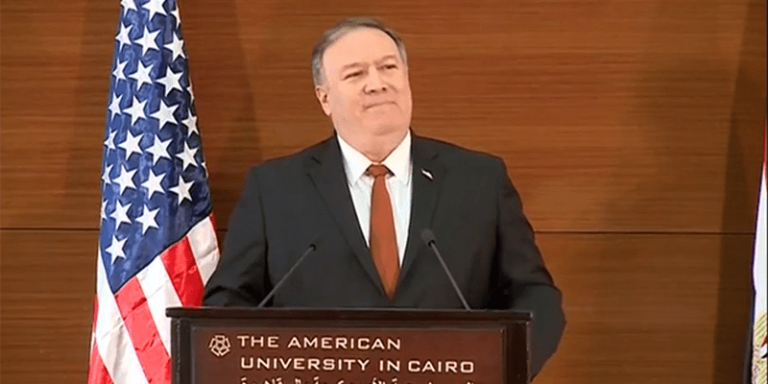
Listening to US Secretary of State Mike Pompeo give his speech at the American University in Cairo, titled “A Force for Good: America’s Reinvigorated Role in the Middle East,” one cannot but remark that Pompeo truly serves a president who has gone out of his way to disparage his predecessors and distort their policies. In fact, considering the current administration’s disdain for defending democracy and protecting human rights in the region and the wider world, it is hard to imagine that Pompeo would endorse former President Barack Obama’s approach to foreign policy. While Obama had many shortcomings regarding important policy matters, most specifically those relating to Libya, Syria, and Yemen, the secretary of state and President Donald Trump are hardly the ones to be lecturing about the United States being “a force for good.”
Three specific issues were central to the secretary’s speech in his reevaluation of American policy and engagement in the Middle East. Pompeo defended the administration’s record on fighting terrorism and eradicating the Islamic State (IS), stating that 99 percent of territories previously controlled by the organization have been liberated. He also highlighted the fact that American forces are still engaged in bombing IS positions and helping the Iraqi government in its operations. However, he did not mention President Trump’s recent decision to withdraw American troops from Syria, where they had been training local forces to fight the Islamic State. Pompeo further skirted the reality that by withdrawing from Syria, the Trump Administration has effectively given the Syrian regime, Russia, and Iran and its affiliated militias the green light to return the country to its prewar authoritarian system. The regime and its allies are responsible for the death of hundreds of thousands and the displacement of over 12 million Syrians as well as the destruction of infrastructure, hospitals, and schools.
Although he did not mention Obama by name, Pompeo was critical of the former president for committing “mistakes” in the Middle East. It is hard to understand how the United States’ role as a force for good would be buttressed by supporting dictators like Abdel-Fattah El-Sisi who has led Egypt back to oppressive rule or letting Israel continue its occupation of Palestinian land thus killing any hope for an independent Palestinian state. Indeed, how could the United States command respect in the region while Pompeo’s administration coddles authoritarian leaders across the Arab world? President Trump still insists, for example, that selling weapons to Saudi Arabia to enrich American coffers is preferable to holding its Crown Prince Mohammed bin Salman accountable for ordering the killing of journalist Jamal Khashoggi, arresting rights activists, and pursuing a criminal war in Yemen.
As the secretary spoke in Cairo about America being a force for good, Israeli occupation forces continued their siege of the Gaza Strip, where two million Palestinians live, and strengthened their military rule over more millions in the West Bank and East Jerusalem. The right-wing Israeli government of Prime Minister Benjamin Netanyahu has scuttled any efforts to arrive at any agreement for an independent Palestinian state and has allowed Israeli settlers in the West Bank and East Jerusalem to forcibly remove Palestinians from their homes and farms. The Trump Administration is today preparing a so-called deal of the century that no intelligent Arab or Palestinian believes will satisfy the minimum requirement for long-term peace. Perhaps by speaking in Cairo, the capital of the first Arab state to have a peace treaty with Israel, the secretary thought that his audience would be ignorant or nonchalant about the plight of Palestinians and ready to believe what the Trump Administration says.
Pompeo’s third central issue was to agitate against Iran and remind everyone of the purported mistake the Obama Administration made in easing the Islamic Republic’s reintegration into the international system. His grand design—and that of National Security Advisor John Bolton—is to build an Arab-Israeli coalition that would serve as a bulwark against Iran and its activities around the region. The secretary of state’s main gripe, which President Trump shares, is Obama’s signing of the Joint Comprehensive Plan of Action (JCPOA) that was intended to limit Iran’s nuclear ambitions and gradually lift the associated sanctions on Tehran.
What conveniently escapes Pompeo, whose rhetoric on Iran has long been employed by Netanyahu, is that the Trump Administration has just freed the Islamic Republic to do as it wishes in Syria and allowed it to have free access and influence in Baghdad, where 5,000 American troops are deployed. He also fails to fully appreciate the cost to American global leadership that Trump’s withdrawal from the JCPOA has caused. Finally, it was strange that Pompeo criticized Obama’s diplomatic approach to Iran especially because he stated that the United States—after withdrawing its troops from Syria—would employ diplomacy to force Iran to abandon Syria. This is clearly an example of the doublespeak that the administration has perfected since January 2017.
Hubris and arrogance are ill-advised in domestic and foreign policies. At present, President Trump insists on a border wall with Mexico to supposedly stop illegal immigration, and he has forced the American government to shut down for close to three weeks. His emissary to the international community pontificates about how the United States can reinvigorate its role in the Middle East by upending previous commitments to stability, democracy, and human rights, lying about engagement, and agitating for a confrontation with Iran. With such a president and secretary of state, it is no wonder that the United States has a very long way to become “a force for good” in the Middle East.

